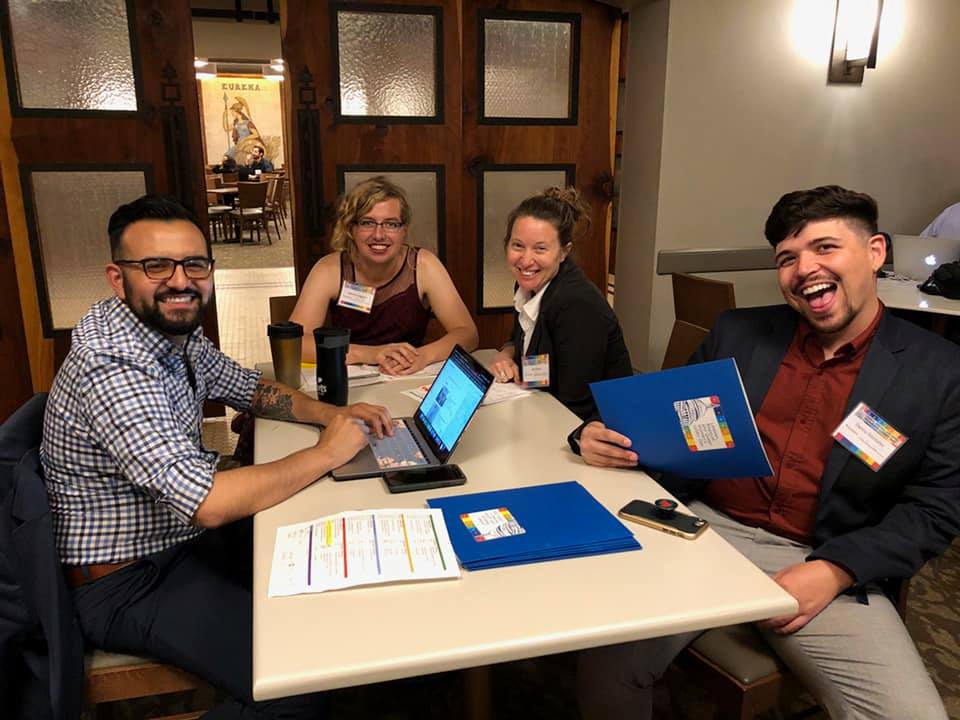Hello, glad you could make it — welcome to the final part of How to Resist. This series is dedicated to all of you activists-at-heart who don’t know how to make yourselves useful (which is generally the starting point for most activists). For the past three weeks, we’ve been laying out some common methods of activism, and making them accessible for you. We’ve done phone banking, and we’ve done canvassing, and today, we are going to talk about lobbying.
What is Lobbying?
Lobbying is the act of going into the physical offices of legislators and speaking either directly with them or with their staffers. To be clear, many progressive politicians refer to lobbyists as a corrupt piece of our system, but what they are really talking about are the corporate shills who have gamed the system by enticing legislators with big money donations and/or seven figure job offers for their post-office career. You yourself can lobby as part of a grassroots movement, and you can be effective at it, without needing the influence of fat stacks of cash.
A key difference between lobbying and phone banking, or lobbying and canvassing, is that lobbying is campaigning explicitly for things we do not get to vote on. That is why it is so important that we do this, and go into these offices.
It’s a common belief that politicians do not care about what we think; well ha, no, they do. Because they need us. If they don’t get the votes, they don’t have a job. This is the most direct way to hold these bozos accountable — you waltz in, ideally backed by constituents, and say, “You need to pass this bill or our community will not support you in reelection.”
It’s common practice here for politicians to lowkey freak out at this type of threat. Much of the time, legislators are asking their staffers how they are supposed to vote, because it is the staffers that field most lobby visits. As I’m sure many others do, I used to just assume that staffers were just the interns running around with big piles of copies or something — but staffers are really the backbone of any political office. Sometimes, you might even want to speak with a staffer over the legislator themselves.
To preface, I have sat at fifteen different lobby visits, so my experience is a bit more limited here. However, I did lobby for a campaign that won. In 2019, the Los Angeles LGBT Center’s Policy & Mobilization Team asked the Californian government to place $17.5 million into various programs that support the healthcare of lesbian and bisexual women. At the time, lesbian and bisexual women had no designated healthcare funding in any of the 50 states, but we ultimately made history through thirty different lobby visits paired with three weekends of phone banking.
Now, there are two kinds of lobbying for state-level work: in-district and out-of-district. In-district is when you visit the legislator at their homebase office. Out-of-district refers to their office at the state capital, which from my understanding, is where legislators spend most of their week. In California, Senators, Representatives, and Assemblymembers take early morning flights on Monday to spend three to four days at the capitol.
It’s common for the state capitol to host lobby days where groups will be in and out all day solely to speak with legislators. This works both ways, however; it’s not that unfeasible for the capitol halls to be packed with anti-vaxxers. Say what you will about those people, but they know how to organize and bring in numbers.
That’s why we need to do the same thing.
What are Lobby Visits?
Lobby visits are short meetings, ranging anywhere from three to ten minutes. Occasionally, a legislator may have a lot of questions, but this is rare. Similar to phone banking and canvassing, lobbying works off of a script and utilizes many of the same skills. It is intimidating at first, because the people you meet with are powerful. However, once you get into the rhythm of it — which is easier to do when you can arrange for multiple same-day visits— it’s fun! Here’s the process:
- You will want to bring a team of somewhere between three to five people, ideally with different perspectives on whatever you are talking about. For the lesbian and bisexual healthcare bill, we made sure that the five of us would all bring a unique perspective to the table. Whether your group tackles various aspects of the bill, or speaks to how it would affect different communities, each voice working together can help create a path forward. One mistake that anti-vaxxer campaigns typically make is that they pack the room too tightly with 20+ people and it gets awkward fast. Keep it small.
- One person will introduce the bill and explain why it is important to them. This usually follows a, “We are asking you to support [this bill] on [voting day.] It’s a bill that will [do great things, I’m sure,] and I care about it because [blah].” You will then go around in a circle hammering in why they must pass this.
- You don’t want to focus too much on policy weeds; you want to focus on storytelling. When it’s time to vote, these stories are the things that legislators remember. You want them to walk away, now having a face to the issue — that makes it a lot harder for a legislator to vote “nay” in good conscience.
- After your group delivers your messaging, the last speaker will close out the visit and pass the handout folder to the legislator or staffer. The folder, which will be prepared by your campaign’s point person, will have more information about the bill and some contact info if questions arise. (Pro-Tip: Legislators and staffers will want to see the folder right away, but only give it to them at the end of the meeting. Otherwise, they’ll stare at the folder the whole time and not pay attention.) Generally, you’ll have an organizer with you that can field questions. If not, that’s okay. It’s not a big deal if you don’t have answers to the legislators’ questions. You can always take note of it and get back to a staffer later.
What to Expect
Now if you are scared of old, cishet white men — first off, that’s real — but get ready to be surrounded by them. The cis will always have a perimeter on you at the capitol. You will shake the hands of many men who look like they’d play an evil oil tycoon in an animated 90s TV movie, and that’s annoying, but ultimately it is worth it. What truly separates lobbying from phonebanking and canvassing is that you are making direct contact with decision makers. It is highly empowering, and really effective towards passing bills. There are a few things to be wary of however:
- Like being an actor, a lot of lobbying is waiting. In one six-hour day, you might only have six visits.
- Occasionally, you do bump into entitled people. In the middle of a lobby visit, a bald white guy in a cowboy hat — he was an oil lobbyist, I shit you not — interrupted our meeting to make small talk with the legislator.
- But it’s not always like that. In our next meeting, we spoke with a staffer who was so enthused by our budget proposal, they dragged some other members of the team into the meeting. This led to a big Instagram selfie with one of the staffers. Following that selfie, another staffer on the legislative team handed out their business cards, and that staffer’s card had they/them (!) pronouns on the front.
- Like with canvassing, don’t judge a book by its cover. My first lobby visit was with someone who proudly displayed a Blue Lives Matter banner in their waiting room — yet she ended up crying after two of us told our personal stories. With that in mind, it is really important to learn how to bite your tongue.
- When phone banking and canvassing, you can get wild responses from people. Lobbying is much more tame. While a legislator might strongly be in favor of your bill, they may still just nod at the end and call it there. So in regards to spicy human interaction, there aren’t as many sparks flying.
Tips for Lobbying
I would actually say that out of the three topics we’ve covered in this series, lobbying might be the easiest, at least in the sense that you only need to speak once and only for about a minute. The biggest challenge lies in creating your own personal story. In phone banking and canvassing, personal stories can help, but they aren’t required. Lobbying actually does need a personal story — it’s the most powerful way to pitch a bill to someone.
- You will definitely want to plan what you want to say before the visit. I would suggest writing it down, and instead of memorizing it, break it down into a sequence of bullet points that will be easier to remember.
- Your story, while personal, does not have to be about you specifically. It is okay (given you received consent) to tell the stories of friends, family, and impacted community members. When advocating for the healthcare bill, I would often mention that all of my queer women-identifying friends had expressed a need for therapy, but none were able to find one.
- Making boundaries is important. For that same healthcare bill, I did have a personal story that I would only tell in certain rooms. When uncomfortable, I would yield to more simple stories about community members that landed just as well. Really, just say things that make your heart thump. Really feel what you are saying and things like that; that’s how you pass a bill.
- You don’t have to be a constituent to the legislators you’re meeting with, but if you are, definitely mention that early on. It makes a huge difference.
- And just to reiterate: Seriously, don’t worry about knowing the legislation you’re lobbying for inside and out. If you asked me how the $17.5 million would be spent to help lesbian and bisexual women, I couldn’t tell ya. But my personal story was fire, so it didn’t matter.
- This is important for any of kind of political action, especially the ones discussed in this series: trust the organizers. Trust the scripts, trust the policies, trust the process. You don’t have to know everything; you just have to strategically use what little time you have to make the maximum impact.
How to Get Involved
Fortunately, a lot of groups lobby. However, I would suggest looking into your area and seeing if there are any policy and advocacy groups, because they sure as heckfire lobby. Getting involved with a local movement is really key to uplifting our communities.
The ACLU and Greenpeace both engage in campaigns that require lobbying. Really, any group focused on policy changes will, like the Sierra Club or Extinction Rebellion. Additionally, you could also reach out to the Animal Legal Defense Fund, the California Campaign Finance Reform, and Friends of the Earth.
Please note that on any list of groups that lobby, you will see the NRA. Again, like anti-vaxxers, these guys are really well organized. A lot of that comes from money; the NRA has more monthly donors than a group like Greenpeace does by a longshot.
Lobbying is more common in the first half of the year. At least from my experiences in California, that is when the state budget is being created and that is the key time to lobby and cast influence on a legislator.
We are at the end of this series now, and I appreciate you reading it. This is part of the way that I resist. If you have not taken action yet, I urge you to find something to do. Return to Part 1 if you need help, because the world actually needs you.
Remember: when we organize, we win.



